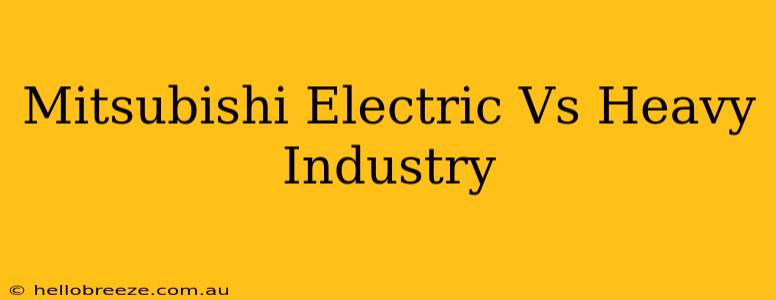Choosing between Mitsubishi Electric and Mitsubishi Heavy Industries (MHI) can be confusing, as both are prominent Japanese conglomerates. While they share a common ancestor, their present-day operations and market focuses differ significantly. This article clarifies the distinction between these two giants.
Understanding Mitsubishi Electric
Mitsubishi Electric Corporation is a global leader in electrical and electronic equipment. Their diverse portfolio includes:
- Home appliances: Air conditioners, refrigerators, washing machines etc.
- Factory automation: Industrial robots, PLCs, and automation systems.
- Power and industrial systems: Power semiconductors, renewable energy solutions, and large-scale power systems.
- Information and communication systems: Semiconductors, communication networks, and IT solutions.
- Automotive equipment: Power electronics, automotive lighting, and car navigation systems.
Mitsubishi Electric's strength lies in its technology-driven approach, focusing on innovation and cutting-edge solutions across numerous sectors. They are known for their high-quality, reliable products and are a major player in the global electronics market.
Key Strengths of Mitsubishi Electric:
- Strong R&D: Significant investment in research and development leading to technological advancements.
- Global reach: Extensive international presence with a strong global distribution network.
- Diverse product portfolio: Caters to various industries, reducing reliance on any single market.
- Reputation for quality: Products are recognized for their reliability and durability.
Exploring Mitsubishi Heavy Industries
Mitsubishi Heavy Industries (MHI) operates in a broader range of heavy industries. Their product portfolio is distinct and focuses on:
- Aerospace: Aircraft manufacturing and related technologies.
- Energy: Power generation systems (nuclear, thermal, and renewable), energy infrastructure.
- Shipbuilding and ocean development: Construction of large ships and offshore structures.
- Industrial machinery: Heavy machinery for diverse industries including construction, manufacturing and mining.
- Infrastructure: Civil engineering projects, transportation systems, and environmental solutions.
MHI is characterized by its involvement in large-scale projects requiring significant engineering expertise and manufacturing capabilities. Their focus is on infrastructure development and industrial solutions at a far larger scale than Mitsubishi Electric's focus.
Key Strengths of Mitsubishi Heavy Industries:
- Expertise in heavy industry: Unmatched experience in engineering, manufacturing, and construction of large-scale projects.
- Global partnerships: Collaborations with leading companies worldwide on major infrastructure projects.
- Diversified business portfolio: Reduces reliance on any single industry sector.
- Strong government relationships: Plays a significant role in national infrastructure projects in Japan.
Mitsubishi Electric vs. MHI: A Direct Comparison
| Feature | Mitsubishi Electric | Mitsubishi Heavy Industries |
|---|---|---|
| Primary Focus | Electrical and electronic equipment | Heavy industries and infrastructure |
| Product Scale | Generally smaller-scale products | Typically large-scale projects and systems |
| Technology Focus | Advanced electronics and automation | Engineering and heavy machinery |
| Market Reach | Broader consumer and industrial markets | More focused on industrial and government projects |
Conclusion: Choosing the Right Mitsubishi
The choice between Mitsubishi Electric and Mitsubishi Heavy Industries depends entirely on your needs. If you require high-tech electronic products or advanced automation solutions, Mitsubishi Electric is likely the better choice. However, if you're involved in large-scale infrastructure projects, heavy machinery, or aerospace, Mitsubishi Heavy Industries provides the relevant expertise and capabilities. Understanding their respective specializations is key to making an informed decision.

